When it comes to achieving healthy and radiant skin, one common concern that many individuals face is facial pigmentation. Uneven skin tone, dark patches, and melasma can affect our confidence and self-esteem. While there are various treatments available, Ayurveda, the ancient Indian system of medicine, offers natural and holistic solutions to combat facial pigmentation. In this article, we will delve into the world of Ayurvedic treatments for facial pigmentation and explore effective remedies that can transform your skin.
Understanding Facial Pigmentation
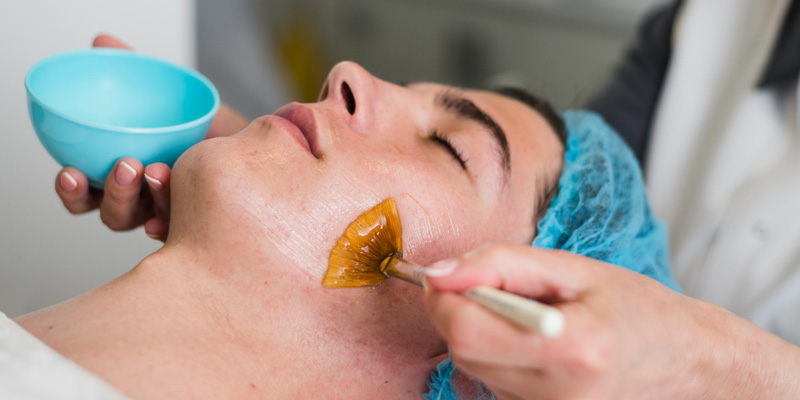
Facial pigmentation refers to the darkening or discolouration of the skin on the face, resulting in an uneven complexion. It can manifest as dark spots, patches, or melasma, which is a common form of hyperpigmentation. Factors such as sun exposure, hormonal changes, genetics, stress, and certain medications can contribute to facial pigmentation.
Causes of Facial Pigmentation
To effectively treat facial pigmentation, it is crucial to understand the underlying cause.
- Sun Exposure: Prolonged and unprotected exposure to the sun’s harmful UV rays can trigger the production of excess melanin, leading to pigmentation issues.
- Hormonal Changes: Fluctuations in hormones, particularly during pregnancy, menopause, or while taking hormonal medications, can contribute to facial pigmentation.
- Genetics: Some individuals are genetically predisposed to develop pigmentation problems, making them more susceptible to facial discolouration.
- Post-Inflammatory Hyperpigmentation: Skin inflammation or injury, such as acne, eczema, or skin trauma, can cause pigmentation concerns as part of the healing process.
Ayurvedic Principles for Skin Health
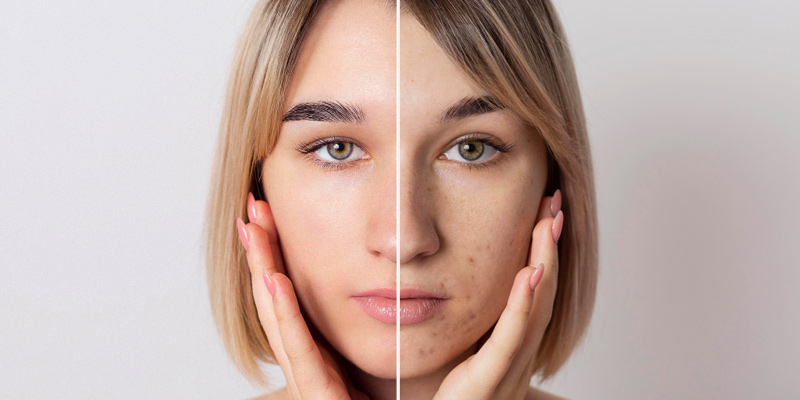
In Ayurveda, skin health is viewed holistically, with emphasis placed on maintaining a balance between the mind, body, and spirit. According to Ayurvedic principles, an individual’s skin type is determined by their dosha, which is a unique combination of energies known as Vata, Pitta, and Kapha. Each dosha has specific characteristics, and imbalances can lead to various skin issues, including pigmentation.
Ayurvedic Treatment for Pigmentation on Face
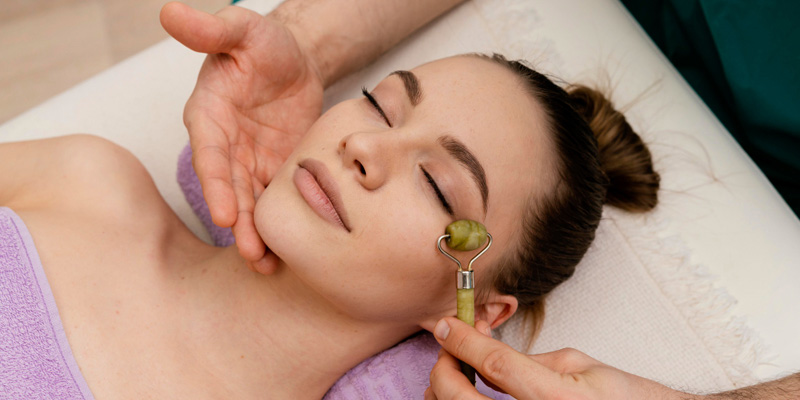
Ayurvedic Herbs and Formulations for Facial Pigmentation
Ayurveda utilizes a wide range of herbs and natural ingredients known for their skin-healing properties. Some of the commonly used herbs for Ayurvedic Treatment For Pigmentation on the face include:
- Turmeric: This golden spice has potent anti-inflammatory and skin-brightening properties, making it effective in reducing pigmentation and improving overall skin tone. You can create a face mask by combining turmeric with other ingredients like milk or yogurt.
- Neem: Known for its antibacterial and antifungal properties, neem helps cleanse the skin, reduce dark spots, and promote a clear complexion. Neem leaves can be ground into a paste and applied to the affected areas.
- Aloe Vera: This soothing plant has cooling and healing properties that can help fade pigmentation and even out skin tone. Apply fresh aloe vera gel directly to the pigmented areas and leave it on for 20-30 minutes before rinsing.
- Liquorice: Licorice extract is a natural skin-lightening agent that can effectively minimize pigmentation and brighten the complexion. Mix liquorice powder with honey or rose water to form a paste and apply it to the affected areas.
Ayurvedic formulations like chandanasava, khadirarishta, and triphala churna are the treatment For Pigmentation On Face. These formulations are prepared using a combination of herbs and can be taken orally or used topically, depending on the individual’s needs.
Ayurvedic Dietary Recommendations for Healthy Skin
In Ayurveda, a balanced diet plays a crucial role in promoting skin health and reducing pigmentation. Including specific foods in your diet can help address the underlying imbalances that contribute to facial pigmentation. Some Ayurvedic dietary recommendations for healthy skin include:
- Eating a variety of fresh fruits and vegetables to obtain essential vitamins and antioxidants that support skin health. Include colourful fruits and vegetables like berries, citrus fruits, spinach, and carrots.
- Incorporating cooling and Pitta-balancing foods such as cucumber, watermelon, coconut, and leafy greens. These foods help cool down the body and balance the Pitta dosha, which is associated with skin inflammation.
- Avoiding Pitta-aggravating foods like spicy, fried, and processed foods, as they can contribute to skin inflammation and pigmentation. Opt for lighter and easily digestible meals.
Ayurvedic Lifestyle Practices for Skin Health
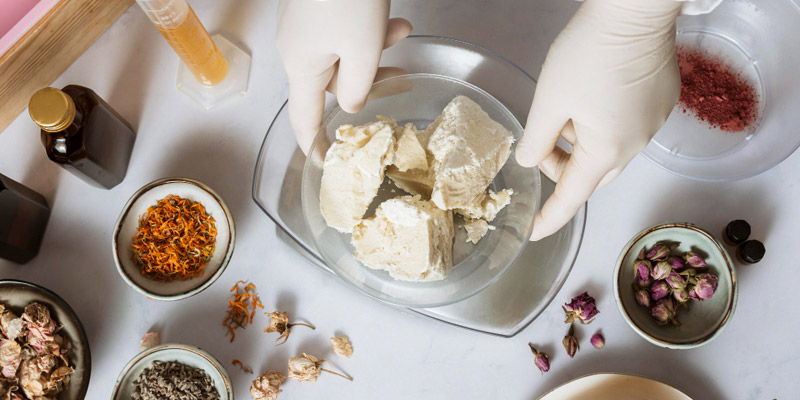
In addition to herbal remedies and dietary adjustments, Ayurveda emphasizes the importance of adopting certain lifestyle practices to maintain healthy skin and reduce facial pigmentation. Some Ayurvedic lifestyle practices for skin health include:
- Practising stress management techniques such as meditation, yoga, and deep breathing exercises, as stress can aggravate pigmentation. Incorporate these practices into your daily routine to promote overall well-being and skin health.
- Getting an adequate amount of sleep allows the body to repair and rejuvenate the skin. Aim for 7-8 hours of quality sleep each night to support healthy skin regeneration.
- Protecting the skin from excessive sun exposure by wearing sunscreen, hats, and protective clothing. Avoid prolonged sun exposure, especially during peak hours, and seek shade whenever possible.
Ayurvedic Facial Therapies for Pigmentation
Ayurvedic facial therapies can provide targeted treatment for facial pigmentation. Some commonly used therapies include:
- Mukhalepam: This Ayurvedic facial treatment involves applying herbal pastes and masks tailored to an individual’s skin type. The masks help exfoliate dead skin cells, reduce pigmentation, and promote a more even skin tone. The ingredients used in the mask may include herbs like sandalwood, rose, and manjistha.
- Nasya: Nasya is a nasal administration of herbal oils or powders that helps balance the doshas and improve overall skin health. It can be beneficial for reducing pigmentation caused by imbalances in the body.
Home Remedies for Facial Pigmentation
Ayurveda offers several effective home remedies that can be incorporated into your skincare routine to reduce pigmentation on the face. Some popular home remedies include:
- Applying a mixture of lemon juice and honey on pigmented areas to lighten the skin and fade dark spots. Lemon juice acts as a natural bleaching agent, while honey moisturizes and nourishes the skin.
- Using cucumber or potato slices on affected areas to soothe the skin and reduce pigmentation. These ingredients have cooling properties and can help lighten dark patches over time.
- Massaging the face with oils such as almond oil or sesame oil to nourish the skin and improve its texture. These oils help hydrate the skin and promote a healthy complexion.
Hyperpigmentation Vs Melasma Ayurvedic Treatment
Melasma Ayurvedic Treatment:
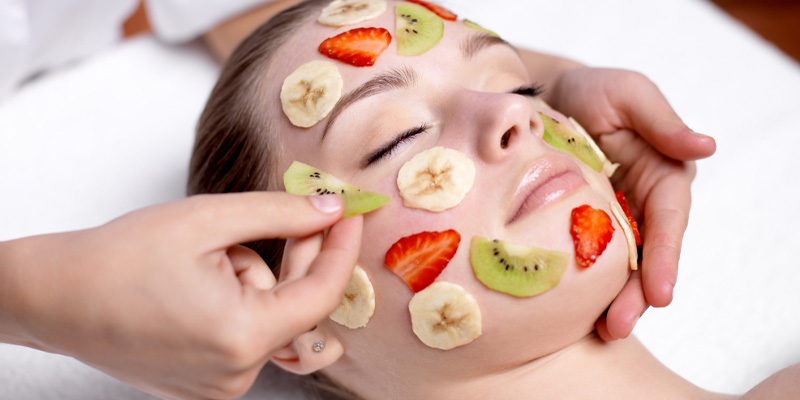
- Focuses on balancing the doshas and regulating hormonal fluctuations.
- Uses specific Ayurvedic herbs and formulations for skin lightening.
- Aims to reduce melasma and fade dark patches on the face.
- Takes a holistic approach to address the underlying causes of melasma.
- Promotes skin rejuvenation and a clear complexion.
Hyperpigmentation Treatment:
- Targets various causes of hyperpigmentation, such as sun exposure and skin trauma.
- Aims to reduce excess Pitta and Vata doshas.
- Involves the use of Ayurvedic herbs, oils, and lifestyle modifications.
- Helps fade dark spots and even out skin tone.
- Promotes overall skin health and rejuvenation.
Prevention and Maintenance
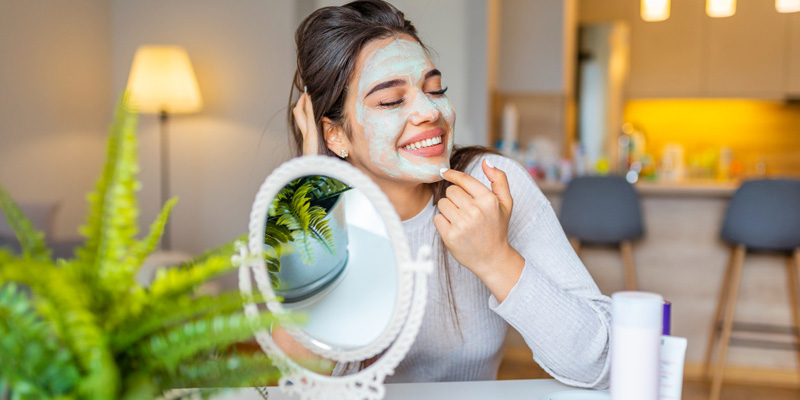
- Prevention and maintenance play a crucial role in managing facial pigmentation. To prevent the recurrence of pigmentation, it is important to:
- Protect your skin from harmful UV rays by wearing sunscreen with a high SPF and reapplying it regularly, especially when exposed to the sun for extended periods.
- Avoid excessive sun exposure, especially during peak hours when the sun’s rays are strongest. Seek shade, wear protective clothing, and use accessories like hats and sunglasses.
- Follow a balanced diet rich in fruits, vegetables, and whole grains. Include foods that are beneficial for skin health and avoid those that can trigger inflammation or hormonal imbalances.
- Practice stress management techniques to keep hormonal fluctuations in check. Engage in activities that promote relaxation, such as yoga, meditation, or hobbies that you enjoy.
- Maintain a regular skincare routine, including cleansing, toning, moisturizing, and exfoliating as needed. Choose skincare products that are suitable for your skin type and free from harsh chemicals.
Conclusion
Ayurvedic treatment for pigmentation on the face, including melasma and dark patches, offers a natural and holistic approach to transforming your skin. By incorporating Ayurvedic herbs, formulations, dietary recommendations, lifestyle practices, and professional therapies, you can effectively address facial pigmentation and restore a clear and even complexion. Ayurveda’s emphasis on balancing the doshas, regulating hormonal fluctuations, and utilizing skin-brightening ingredients can help fade pigmentation, reduce melasma, and diminish dark patches on the face. Say goodbye to uneven skin tone and embrace the power of Ayurveda for radiant and healthy skin.
FAQs
How effective is Ayurvedic treatment for pigmentation on the face?
Ayurvedic treatment can be highly effective in reducing pigmentation on the face. However, the results may vary depending on individual factors, such as the severity of pigmentation and consistency in following the treatment regimen.
Is Melasma Ayurvedic Treatment Effective?
Yes, Ayurvedic Treatment for Melasma is very effective. Ayurvedic treatments focus on balancing the doshas, addressing hormonal imbalances, and using specific herbs and formulations known for their skin-lightening properties.
Are there any specific Ayurvedic herbs for treating dark patches on the face?
Yes, Ayurveda suggests the use of herbs such as turmeric, neem, aloe vera, and liquorice to reduce dark patches on the face. These herbs have natural skin-lightening properties and can help fade dark spots over time.
Can melasma recur after Ayurvedic treatment?
Melasma can have a tendency to recur, even after successful Ayurvedic treatment. To minimize the chances of recurrence, it is essential to follow a proper skincare routine, protect the skin from excessive sun exposure, and maintain a healthy lifestyle as recommended by Ayurvedic principles.
How does Ayurvedic treatment address dark patches on the face?
Ayurvedic treatment focuses on identifying and addressing the underlying imbalances that contribute to dark patches on the face. Through the use of specific herbs, formulations, dietary recommendations, and lifestyle modifications, Ayurveda aims to promote skin health and reduce the appearance of dark patches.
Are there any dietary restrictions for dark patches on the face Ayurvedic treatment?
Ayurvedic treatment for dark patches on the face may involve dietary recommendations based on an individual’s dosha imbalance. While there may be certain dietary restrictions, it is best to consult with an Ayurvedic practitioner to receive personalized guidance regarding dietary modifications.